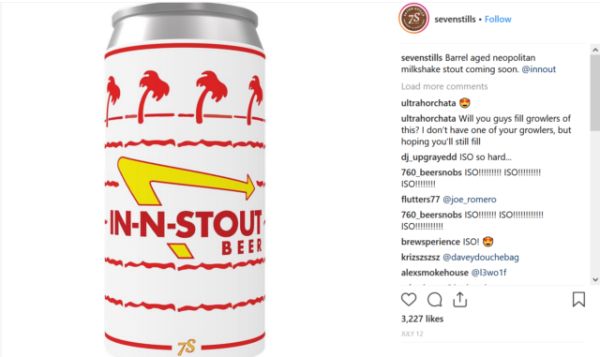A familiar adage teaches that one catches more flies with honey than with vinegar. Without in any way implying that infringers are flies, we can apply this lesson to the trademark context. It seems that trademark attorneys enforcing their clients' rights have really taken this wisdom to heart in recent years. With increasing frequency, trademark cease and desist letters filled with humor and whimsy fill the news.
Most recently, In-N-Out Burger sent a cease and desist letter to Seven Stills Brewery, which had just announced a forthcoming new beer in a can bearing markings very similar to In-N-Out Burger's logo and the name "In-and-Stout." Seven Stills also tagged In-N-Out in the announcement.

In-N-Out's letter was filled with beer puns. Seven Stills posted a copy of it on its Instagram accounts:

Though friendly (and playful) in tone, the letter clearly alerted Seven Stills to In-N-Out Burger's trademark concerns and invited Seven Stills to work out an amicable resolution. It appears that happened because Seven Stills' next post about the matter involved a video announcement that its new stout would not appear in a "knock off can you think you saw once" and that the first 100 customers buying the can at the brewery would receive a free In-N-Out burger.
In-N-Out Burger's letter was witty (note the beer puns), friendly (clearly seeking an amicable resolution), and direct. The letter not only got Seven Stills' attention, it received the attention of the consuming public. And it offered a pathway to resolution that allowed both parties to maintain their goodwill with the public.
This style of letter seems best suited to enforcing trademark rights against someone who appears to be a misguided but well-meaning fan (or friend) of the offended brand. The first letter I remember hearing about in this genre was from Jack Daniels Properties to Patrick Wensink, the author of a book entitled "Broken Piano for President" whose cover bore a striking resemblance to the Jack Daniels label:

Though it did not contain puns or witticisms, the letter from Jack Daniels Properties was gentle and friendly, acknowledging openly that the recipient was a fan of the brand and finding common ground in his interest in protecting his own intellectual property rights.

At the time this was news (about six years ago), I recall the letter being described as the "most polite" cease and desist letter ever written. In my experience, most trademark lawyers are polite. What makes this letter stand out is how it draws on empathy, both in understanding that the author's actions stemmed from a love of the brand, and in asking the author to understand Jack Daniels Properties' need to enforce its trademark rights to preserve the strength of the beloved brand.
Perhaps the fame of the Jack Daniels Properties letter gave some attorneys the idea that getting published could mean more than a journal article (or a blog post). Young lawyers are often cautioned to write cease and desist letters that they wouldn't mind seeing attached to a pleading filed in court. But did the Jack Daniels Properties letter inspire lawyers to write cease and desist letters they would like to see posted on social media?
After the Jack Daniels Properties letter, we saw cease and desist letters that upped the ante from friendly to witty. Last year, a lawyer from NetFlix sent a cease and desist letter to Emporium Arcade, which had launched a six week pop up bar with a "Stranger Things" theme. As you might anticipate, the letter made many allusions to the '80s (and to the show itself):

Again, the letter treats the recipients as the fans they are, trying to coax compliance in a friendly way by keeping them on the brand's side.
Often when there's a trademark issue, the marketing department calls the lawyers. Not to shortchange the lawyers on creativity, but in the case of some of these cease and desist letters, I wonder if the lawyer called the marketing department in anticipation that the letter could be a public relations event.
These letters are good illustrations of the old adage quoted above. By remaining friendly in tone, reminding the recipient of their admiration for the brand and enlisting them as an ally in protecting the brand, by injecting levity through puns or humor, these letters may get more cooperation (and more friendly publicity) than the traditional cease and desist and may avoid alienating a brand fan in the process.
The lawyers at Trademarkology provide trademark registration services backed by the experience and service of one of the nation's oldest law firms. Click here to begin the process of protecting your brand name with a federally registered trademark.
The content of this article is intended to provide a general guide to the subject matter. Specialist advice should be sought about your specific circumstances.
